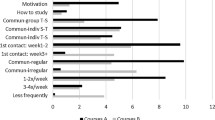Abstract
Due to the covid-19 pandemic, great changes appeared in education in general and digital technologies played a substantial role in the process. The main objective of this research is to consider students’ feedback and opinions on teaching and learning English for Specific Purposes (ESP) in (a) the present form before schools were closed due to the pandemic, (b) the online distance form of instruction during the pandemic, and (c) the present form of instruction after the pandemic. Research questions focused on three areas: (1) what form(s) of instruction students preferred, (2) whether/how digital technologies contributed to the process of instruction, and (3) in which form of instruction they learned more. The ex-post-facto approach and mixed methodology were applied. Data were collected by questionnaire. It was available online for students of the upper secondary school for medical staff (N = 153) and advanced school for higher medical staff (N = 183). We expect that (1) the present form of instruction after the covid-19 pandemic will be appreciated; however, there will also be some supporters of online distance instruction; (2) it will be the present form that will allow students to learn more compared to online distance instruction; (3) both teachers and students will improve their digital skills during the pandemic so that technologies can be exploited to a wider extent in the present form of instruction after the pandemic.
Access this chapter
Tax calculation will be finalised at checkout
Purchases are for personal use only
Similar content being viewed by others
References
Act N. 349/2020 Coll., § 184a Zvláštní pravidla při omezení osobní přítomnosti dětí, žáků a studentů ve školách [Changes limiting the present attendance of children, pupils, and students at schools] [online] 349/2020 Sb. Zákon, kterým se mění zákon č. 561/2004 Sb., o předškolním, základním, středním, vyšším odborném a j... (zakonyprolidi.cz). Accessed 22 Mar 2022
Ministry of Education: Metodické doporučení pro vzdělávání distančním způsobem [Didactic recommendation for distance education]. MŠMT, Praha, 23.9.2020 (2020). Accessed 22 Mar 2022
Czech School Inspectorate (CSI): Distance learning in basic and upper secondary schools in the Czech Republic (abridged version for international audience). Thematic report. Czech School Inspectorate [online] Česká školní inspekce (oecd.org) (2020). Accessed 22 Mar 2022
Avsheniuk, N., Seminikhyna, N., Svyrydiuk, N., Lutsenko, O.: ESP students’ satisfaction with online learning during the covid-10 pandemic in Ukraine. Arab World Engl. J. Spec. Issue, 222–234 (2021). https://doi.org/10.24093/awej/covid.17
Mihai, M., Albert, C.N., Mihai, V., Dumitras, D.E.: Emotional and social engagement in the English language classroom for higher education students in the covid-19 online context. Sustainability 14(8), Article number 4527 (2022). https://doi.org/10.3390/su14084527
Gavranovic, V., Prodanovic, M.: ESP teachers’ perspectives on the online teaching environment imposed in the covid-19 era – a case study. New Educ. Rev. 64, 188–197 (2021). https://doi.org/10.15804/tner.2021.64.2.15
Felder, R.M.: Learning and teaching styles in engineering education. Eng. Educ. 78(7), 674–681 (1988)
Petrovic, F., Murgas, F., Kralik, R.: Happiness in Czechia during covid-19 pandemic. Sustainability 13(19), Article number 10826 (2021). https://doi.org/10.3390/su131910826
Cirus, L., Manenova, M., Skoda, J.: Teachers’ attitudes towards ICT and their reflection in the pupils’ digital literacy. EDUCA: Usti nad Labem (2019)
Dvorakova, K., Emmer, J., Janktova, R., Klementova, K.: From f2f to ERT: university students’ perception of remote learning during the first covid_19 lockdown. J. Effic. Responsib. Educ. Soc. 14(2), 89–100 (2021)
Holzer, J., et al.: Adolescent well-being and learning in times of COVID-19—a multi-country study of basic psychological need satisfaction, learning behavior, and the mediating roles of positive emotion and intrinsic motivation. PLoS ONE 16(5), e0251352 (2021). https://doi.org/10.1371/journal.pone.0251352. Accessed 02 June 2022
Prodanović, M., Gavranović, V.: Students’ satisfaction with learning experience in COVID-19 imposed virtual education environment. Revista Publicando 8(29), 124–131 (2021). https://doi.org/10.51528/rp.vol8.id2190. Accessed 01 June 2022
Faltynkova, L., Simonova, I., Kostolanyova, K., Klimszova, S.: Re-thinking and re-defining the learning process? Students’ feedback on online distance instruction. In: Li, R., Cheung, S.K.S., Iwasaki, C., Kwok, L.-F., Kageto, M. (eds.) ICBL 2021. LNCS, vol. 12830, pp. 78–91. Springer, Cham (2021). https://doi.org/10.1007/978-3-030-80504-3_7
Simonova, I., Faltynkova, L., Kostolanyova, K.: Students’ reflection on online distance learning: advantages, disadvantages, recommendations. In: Li, R., Cheung, S.K.S., Iwasaki, C., Kwok, L.-F., Kageto, M. (eds.) ICBL 2021. LNCS, vol. 12830, pp. 275–286. Springer, Cham (2021). https://doi.org/10.1007/978-3-030-80504-3_23
Author information
Authors and Affiliations
Corresponding author
Editor information
Editors and Affiliations
Rights and permissions
Copyright information
© 2023 The Author(s), under exclusive license to Springer Nature Switzerland AG
About this paper
Cite this paper
Faltynkova, L., Simonova, I., Kostolanyova, K. (2023). Students’ Feedback on Teaching and Learning English for Specific Purposes Before, During, and After the Covid-19 Pandemic. In: Auer, M.E., Pachatz, W., Rüütmann, T. (eds) Learning in the Age of Digital and Green Transition. ICL 2022. Lecture Notes in Networks and Systems, vol 634. Springer, Cham. https://doi.org/10.1007/978-3-031-26190-9_56
Download citation
DOI: https://doi.org/10.1007/978-3-031-26190-9_56
Published:
Publisher Name: Springer, Cham
Print ISBN: 978-3-031-26189-3
Online ISBN: 978-3-031-26190-9
eBook Packages: Intelligent Technologies and RoboticsIntelligent Technologies and Robotics (R0)




